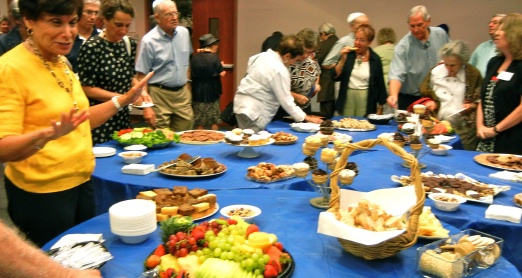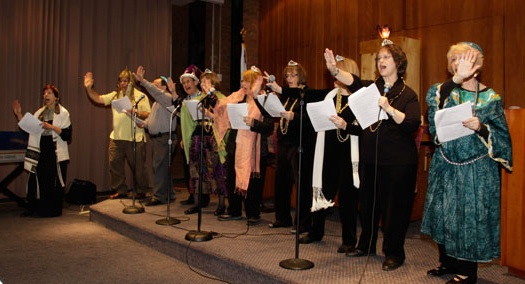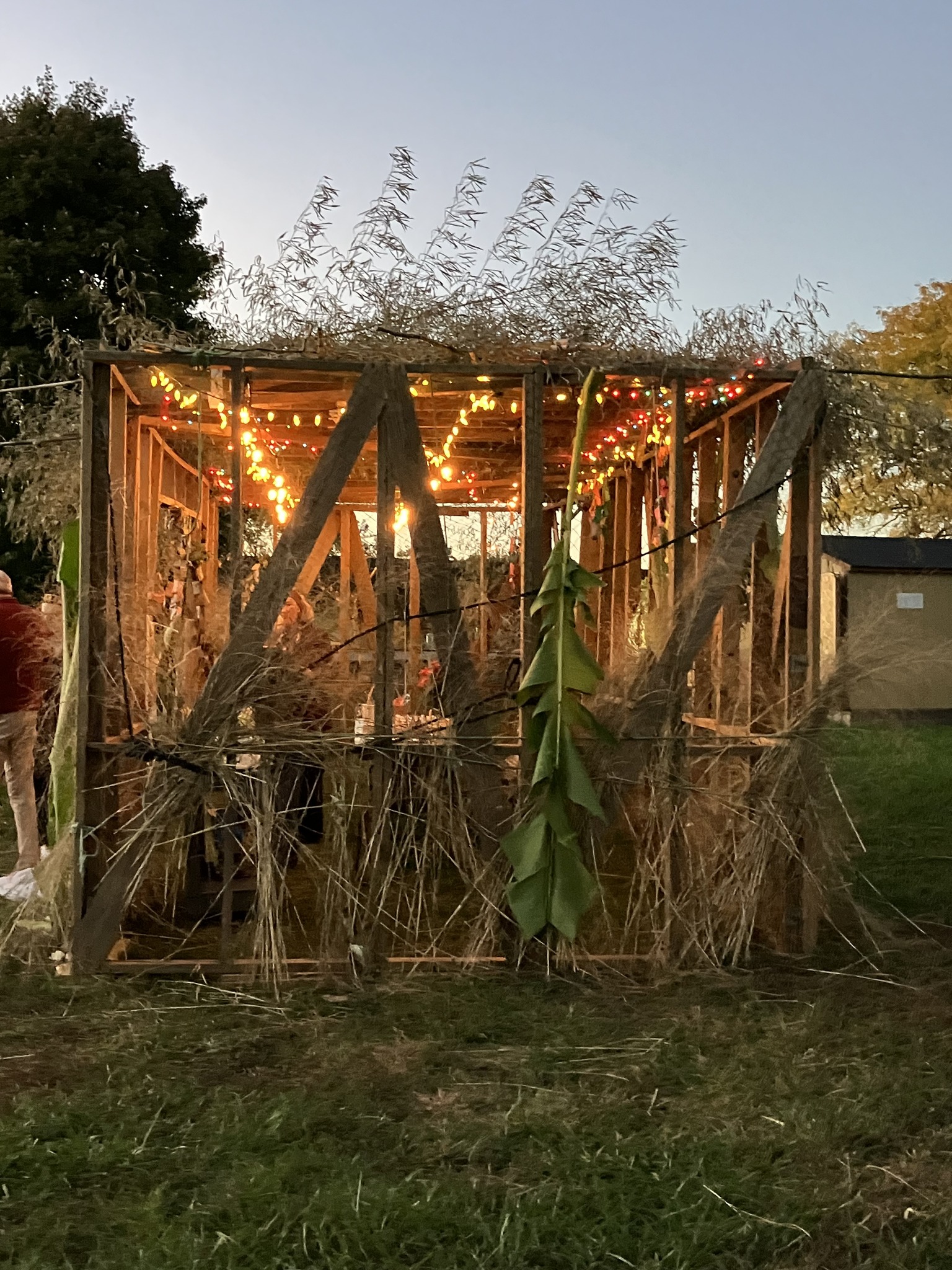 The Holidays page provides you with a portal to information about the major Jewish holidays and how we celebrate them at Bet Aviv. Under this heading you will find information about the following Jewish holidays:
The Holidays page provides you with a portal to information about the major Jewish holidays and how we celebrate them at Bet Aviv. Under this heading you will find information about the following Jewish holidays:
Oneg Shabbat

An Oneg Shabbat is a wonderful way to catch up with old friends and make new ones.
Bet Aviv welcomes its congegants to usher in Shabbat at our Oneg following the Shabbat service. As we move into our Oneg room, our Shabbat Hosts distribute wine to our congregants. We recite the kiddush (blessing for the wine) and motzi (blessing for the bread) as we form a circle around the Oneg table. We pass around the challah after the motzi. Then we get a chance to welcome guests who have come to visit, greet long-time friends and say hello to members we would like to get to know better. Bet Aviv has hired a person with food management experience to purchase the food for our Onegs, plate and display the array, replenish food and drink as required during the Oneg, and to clean up afterwards. As part of bringing tikun olam to Shabbat, we package up leftover food and bring it to Grassroots, a local shelter that feeds the hungry.
We encourage members to celebrate their mitzvahs with the congregation. If you have a special birthday, anniversary, or event (e.g., baby naming, retirement) in your life and would like to sponsor an Oneg, please contact our office. Click here to download the Oneg Sponsorship form.
Click here for the blessing over the wine (Borei p’ri hagafen).
Click here for the blessing over the bread (HaMotzi).
Purim
Purim is celebrated with a public reading—usually in the synagogue—of the Scroll of Esther (M’gillat Esther), which tells the story of the holiday. Under the rule of King Ahashverosh, Haman, the king’s prime minister, plots to exterminate all of the Jews of Persia. His plan is foiled by Queen Esther and her cousin Mordechai, who ultimately save the Jews of Persia from destruction. The reading of them’gillah typically is a rowdy affair, punctuated by booing and noise-making when Haman’s name is read aloud.
Purim is an unusual holiday in many respects. First, Esther is the only biblical book in which God is not mentioned. Second, Purim, like Hanukkah, traditionally is viewed as a minor festival, but elevated to a major holiday as a result of the Jewish historical experience. Over the centuries, Haman became the embodiment of every anti-Semite in every land where Jews were oppressed. The significance of Purim lies not so much in how it began, but in what it has become: a thankful and joyous affirmation of Jewish survival against all odds.
Read more about the history and customs of Purim.

Simchat Torah
Simchat Torah (Rejoicing in the Law) celebrates the completion of the annual reading of the Torah. This joyous festival provides opportunities for Jews to affirm the centrality of Torah in their lives, as well as to demonstrate their commitment to lifelong study. As part of the celebration, the Torah scrolls are taken from the ark and carried or danced around the synagogue seven times. During the Torah service, the concluding section of the fifth book of the Torah, D’varim (Deuteronomy), is read, and immediately following, the opening section of Genesis, or B’reishit as it is called in Hebrew, is read. This practice represents the cyclical nature of the relationship between the Jewish people and the reading of the Torah.
Read more about the history and customs of Simchat Torah.
Sukkot
 Sukkot, a Hebrew word meaning “booths” or “huts,” refers to the Jewish festival of giving thanks for the fall harvest, as well as the commemoration of the forty years of Jewish wandering in the desert after Sinai. Sukkot is celebrated five days after Yom Kippur on the 15th of Tishrei and is marked by several distinct traditions. One tradition, which takes the commandment to “dwell in booths” literally, is to build a sukkah, a booth or hut. A sukkah is often erected by Jews during this festival, and it is common practice for some to eat and even live in these temporary dwellings during Sukkot.
Sukkot, a Hebrew word meaning “booths” or “huts,” refers to the Jewish festival of giving thanks for the fall harvest, as well as the commemoration of the forty years of Jewish wandering in the desert after Sinai. Sukkot is celebrated five days after Yom Kippur on the 15th of Tishrei and is marked by several distinct traditions. One tradition, which takes the commandment to “dwell in booths” literally, is to build a sukkah, a booth or hut. A sukkah is often erected by Jews during this festival, and it is common practice for some to eat and even live in these temporary dwellings during Sukkot.
Read more about the history and customs of Sukkot.
Hanukkah
Hanukkah (alternately spelled Chanukah), meaning “dedication” in Hebrew, refers to the joyous eight-day celebration during which Jews commemorate the victory of the Maccabees over the armies of Syria in 165 B.C.E. and the subsequent liberation and “rededication” of the Temple in Jerusalem. The modern home celebration of Hanukkah centers around the lighting of the chanukiyah, a special menorah for Hanukkah; foods prepared in oil including latkes (potato pancakes) and sufganiyot(jelly donuts); and special songs and games.
Read more about the history and customs of Hanukkah.
Shabbat Service Resources
Celebrating shabbat at home with family and friends creates a warm and wonderful end to your week. Saying or singing blessings over family, candles, wine and challah helps make it sacred. Enjoy this guide from Larchmont Temple, NY. Shabbat Shalom!
Shabbat Service Honors
Each Shabbat one of the members of our Ritual committee contacts congregants to offer them the special honor of partipating in the service. Our members recite Shabbat candle blessings and participate in all aspects of the Torah service – from opening and closing the ark to reciting the Torah blessings.
To assist those who have agreed to participate, we’ve published a list of instructions so that you’ll know exactly what to do. Click here for the Shabbat service honor instructions.
Shabbat Host
Resources
Shavuot
Shavuot is the Hebrew word for “weeks” and refers to the Jewish festival marking the giving of the Torah at Mount Sinai, which occurs seven weeks after Passover. Shavuot, like many other Jewish holidays, began as an ancient agricultural festival that marked the end of the spring barley harvest and the beginning of the summer wheat harvest. In ancient times, Shavuot was a pilgrimage festival during which Israelites brought crop offerings to the Temple in Jerusalem. Today, it is a celebration of Torah, education, and actively choosing to participate in Jewish life.
Read more about the history and customs of Shavuot.
